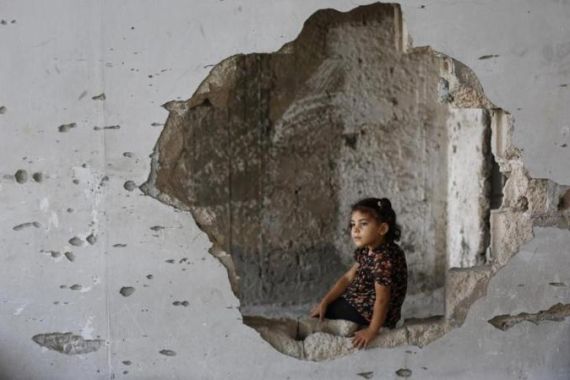Israel’s Gaza probe raises questions
Seven military misconduct investigations stemming from Gaza war have been closed, sparking criticism of enquiry methods.

Ramallah – The closure of seven investigations into allegations of Israeli military misconduct during Operation Protective Edge, the summer assault on the Hamas-controlled Gaza Strip, has raised questions about Israel’s methods of enquiry, experts say.
This week, the Israeli army announced it had opened eight new investigations into allegations of military misconduct during its latest operation, which killed more than 2,100 Palestinians. The army simultaneously announced it was closing seven similar investigations involving alleged attacks on hospitals, United Nations infrastructure, medical workers and civilians. Major General Danny Efroni, the Military Advocate General (MAG) in charge of the investigations, “did not find that the forces’ actions” constituted “reasonable grounds for suspicion” in these incidents.
Bill van Esveld, a senior researcher with Human Rights Watch, told Al Jazeera that the Israeli military had a “very poor record of accountability” on internal investigations. Van Esveld expressed concern over the methods used, including the Israeli army’s fact-finding assessment mechanism, noting that in some cases, the MAG “only interviewed [Israeli army] personnel” and disregarded contradictory testimony from Palestinians.
The Israeli army declined to comment beyond its news release.
OPINION: Investigating the Gaza conflict
Of the more than 2,100 Palestinians who died during Operation Protective Edge, according to the UN, more than two-thirds were civilians. Israel, meanwhile, lost 66 soldiers and six civilians in the fighting, which caused extensive structural damage to vital infrastructure and entire neighbourhoods in Gaza, with repairs estimated to cost at least $7.8bn and take five years.
“This military operation, [when] compared to the previous two – Cast Lead and Pillar of Defence – seems like it was the most aggressive,” Saleh Hijazi, a researcher for Amnesty International, told Al Jazeera. He added that Israeli shelling during Protective Edge was seemingly “indiscriminate” and people saw “fire coming from every direction”.
The circumstances surrounding the violence in Gaza underscore the importance of independent investigators in subsequent fact-finding missions, experts say. But Israel has repeatedly denied access to the occupied Palestinian territories for these investigators, including UN Special Rapporteur Makarim Wibisono and the Gaza Commission of Inquiry headed by Professor William Schabas.
“There’s no interest for them to have investigators on the ground, looking at evidence while it’s fresh,” Hijazi said.
Israeli investigations into rights violations in the West Bank, including the murder of civilians, also frequently drag on for years without resolution.
“Since 2011, almost all cases where Palestinians are killed in the West Bank [result] in military investigations,” Sarit Michaeli, spokesperson and investigator for the Israeli rights group B’Tselem, told Al Jazeera. “The problem is that there is very little military accountability.”
In 2011, Israel changed its policy towards fatalities caused by Israeli forces in the West Bank. The MAG was instructed to initiate a military police investigation into the death of every Palestinian who was “not taking part” in hostilities. However, this has not resulted in an increase of accountability within the Israeli army, Michaeli said.
“Cases are opened but [rarely] closed,” Michaeli said. “There is foot-dragging among officials,” and when a decision is made and a case closed, it is usually without charge.
B’Tselem has compiled a list of over 30 cases of Palestinian fatalities under military investigation between 2011 and 2014. The research supports Michaeli’s claims: Only six cases have been closed, all without indictment. Another Israeli rights group, Yesh Din, said that in spite of their “legal obligations”, Israeli security forces in the West Bank frequently participate or stand idly by “while violence is committed against the people of the West Bank, in flagrant violation of their duty to protect civilians” under international law.
The group found that the overwhelming majority of abuses go unnoticed or unreported, in part because of a lack of access to military police stations for Palestinians, making it “literally impossible” for them to file complaints directly with military police.
RELATED: UN announces Gaza war inquiry
Back in Gaza, Raji Sourani, founder of the Palestinian Centre for Human Rights and a lawyer with decades of experience in human rights law, reflected on the hardships faced by residents of the densely populated coastal strip, including three major Israeli offensives since 2008.
“Due to this prolonged experience, we believe in a clear-cut way, as people who have suffered under years of aggression … that the [Israeli] system provides full immunity for war criminals,” Sourani told Al Jazeera.
“Gaza’s citizens were in the eye of the storm,” he added, noting the many “war crimes” and “crimes against humanity” perpetrated during Operation Protective Edge were documented by both Palestinian and foreign human rights groups.
Sourani expressed a lack of hope for consequences of Israel’s actions, noting that by his estimation: “Israel will not seek to hold anyone suspected of violations accountable.”